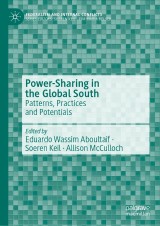Details

Power-Sharing in the Global South
Patterns, Practices and PotentialsFederalism and Internal Conflicts
|
CHF 142.00 |
|
| Verlag: | Palgrave Macmillan |
| Format: | |
| Veröffentl.: | 22.02.2024 |
| ISBN/EAN: | 9783031457210 |
| Sprache: | englisch |
Dieses eBook enthält ein Wasserzeichen.
Beschreibungen
<p>Power-sharing serves as a popular conflict resolution device at war’s end. Yet, the performance record of such arrangements is highly variable, sometimes leading to peace and stability and at other times to immobilism and institutional collapse. This book explores the adoption, function, and dissolution of power-sharing arrangements across the Global South, including case studies of Colombia, Ethiopia, Malaysia, and Iraq, and others to make sense of this mixed record. Authors identify a range of contextual factors as well as significant variations in the institutional rules and their meaning across the cases that help to explain divergent power-sharing outcomes. Emphasis throughout the chapters is placed on system adaptability for power-sharing success.</p><br><p></p>
Chapter 1: Introduction: Power-Sharing in the Global South.- Chapter 2: Power-Sharing in the Global South in Comparative Perspective: Patterns and Practices.- Chapter 3: The Idea of Power-Sharing in South Africa’s Transition from Apartheid to Constitutional Democracy (1983–1993).- Chapter 4: Power-Sharing in Colombia: Bipartisanship, Leftist Insurgencies, and Beyond.- Chapter 5: Power Sharing Processes in post-Arab Spring Tunisia: From Elite Compromise to Presidential Monopolization.- Chapter 6: Power-Sharing in India: Limits of Territorial Arrangements and the Relevance of Consociationalism.- Chapter 7: Power-Sharing in Nigeria’s Divided Society: Structures, Conflicts and Challenges.- Chapter 8: Power-Sharing in Malaysia: Coalition Politics and the Social Contract.- Chapter 9: The Puzzle of Power-Sharing in Mauritius.- Chapter 10: Lebanon: Consociationalism Between Immobilism and Reform.- Chapter 11: Consociational Democracy Without Minority Veto? Power-Sharing in Ethiopia.- Chapter 12: The Power-Sharing Arrangements in Iraq: The Instability Within.- Chapter 13: “The Unloved Child Matures”: Power-Sharing in Burundi.- Chapter 14: On the Adoptability of Power-Sharing in Syria, Eduardo Wassim Aboultaif.- Chapter 15: The Pacific Islands: The Centrality of Context for Power-Sharing in the Global South.- Chapter 16: Conclusion: The Power-Sharing Lifecycle across the Global South, Allison.
<p><b>Eduardo Wassim Aboultaif</b> is Assistant Professor of politics at the Higher Institute of Political and Administrative Sciences in the Holy Spirit University of Kaslik, Lebanon.</p><p><b>Soeren Keil</b> is Academic Head of the International Research and Consulting Centre at the Institute of Federalism, University of Fribourg, Switzerland.</p><p> </p><p><b>Allison McCulloch</b> is Professor of Political Science at Brandon University, Canada.</p><p></p><p></p>
"Assessing consociationalism and other forms of power-sharing from across the Global South, this volume is both timely and needed, helping to broaden and deepen our understanding of how such arrangements come into being, how they function, and how they adapt over time. The book will be of interest not only for power-sharing scholars but for anyone interested in understanding the challenges of making democracy work in divided societies across the Global South."<div><p></p>
---<b>Arend Lijphart</b>, Professor Emeritus of Political Science, University of California San Diego<p></p></div><div><p>Power-sharing serves as a popular conflict resolution device at war’s end. Yet, the performance record of such arrangements is highly variable, sometimes leading to peace and stability and at other times to immobilism and institutional collapse. This book explores the adoption, function, and dissolution of power-sharing arrangements across the Global South, including case studies of Colombia, Ethiopia, Malaysia, and Iraq, and others to make sense of this mixed record. Authors identify a range of contextual factors as well as significant variations in the institutional rules and their meaning across the cases that help to explain divergent power-sharing outcomes. Emphasis throughout the chapters is placed on system adaptability for power-sharing success.<b></b></p></div><div><p></p></div><div><p></p><p><b>Eduardo Wassim Aboultaif</b> is assistant professor of politics at the Higher Institute of Political and Administrative Sciences in the Holy Spirit University of Kaslik, Lebanon.</p>
<p><b>Soeren Keil</b> is Academic Head of the International Research and Consulting Centre at the Institute of Federalism, University of Fribourg, Switzerland.</p>
<p><b>Allison McCulloch</b> is Professor of Political Science at Brandon University, Canada.</p><br><p></p></div>
---<b>Arend Lijphart</b>, Professor Emeritus of Political Science, University of California San Diego<p></p></div><div><p>Power-sharing serves as a popular conflict resolution device at war’s end. Yet, the performance record of such arrangements is highly variable, sometimes leading to peace and stability and at other times to immobilism and institutional collapse. This book explores the adoption, function, and dissolution of power-sharing arrangements across the Global South, including case studies of Colombia, Ethiopia, Malaysia, and Iraq, and others to make sense of this mixed record. Authors identify a range of contextual factors as well as significant variations in the institutional rules and their meaning across the cases that help to explain divergent power-sharing outcomes. Emphasis throughout the chapters is placed on system adaptability for power-sharing success.<b></b></p></div><div><p></p></div><div><p></p><p><b>Eduardo Wassim Aboultaif</b> is assistant professor of politics at the Higher Institute of Political and Administrative Sciences in the Holy Spirit University of Kaslik, Lebanon.</p>
<p><b>Soeren Keil</b> is Academic Head of the International Research and Consulting Centre at the Institute of Federalism, University of Fribourg, Switzerland.</p>
<p><b>Allison McCulloch</b> is Professor of Political Science at Brandon University, Canada.</p><br><p></p></div>
Provides comprehensive empirical overviews of power-sharing discussions and experiences from across the Global South Covers a diverse set of individual cases as well as a comparative chapter and comparative framing Discusses the specific institutional design and how it came into being and how it has evolved over time for each case
Diese Produkte könnten Sie auch interessieren:

Herausforderungen und Chancen eines künstlerischen Wettbewerbs für ein Mahnmal in Gedenken an die Opfer des 19. Februar 2020 in Hanau

von: Katharina Meyer zu Eppendorf

CHF 30.00

Der erste arabisch-israelische Krieg und seine Folgen für die Palästinenser

von: Dean Sánchez Pedregoso

CHF 16.00














